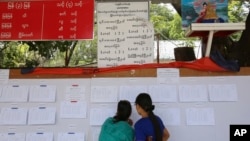Elections officials in Burma have completed the process of examining the eligibility of more than 6,000 candidates who applied to compete in national elections set for November 8. Political hopefuls representing the Southeast Asian nation’s more than 90 political parties and over 300 independents submitted candidacy applications for Parliament’s 1,171 seats. The process was long and complicated, and as decisions have been announced on who will be on the ballot and who won’t, it also appears inequitable as well.
Burma’s Union Election Commission, or UEC, rejected approximately 100 candidates who submitted applications, with over half of the cases rejected on citizenship grounds. An ethnic Rohingya Muslim from Rakhine State was disqualified because he allegedly didn’t meet the citizenship criteria, despite serving in the Union Parliament since 2010.
The United States is concerned about the candidate disqualifications and is watching the situation closely. Almost all Muslim candidates were reportedly disqualified, but authorities have yet to provide the specific reasons why they didn’t meet the citizenship criteria. Parties may not submit a new candidate to replace one who has been disqualified, severely disadvantaging smaller political groups.
These elections are vitally important for Burma’s people and its future. But there are concerns about the constitutional provision that reserves 25 percent of parliamentary seats for the military and the disenfranchisement of temporary registration certificate holders. The move to disqualify candidates through an opaque and discriminatory process risks undermining the confidence of the Burmese people and the international community in these elections.
We urge the Burmese authorities to redouble their efforts to address these concerns transparently and ensure that the upcoming elections constitute a step forward for the country.






